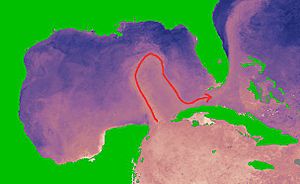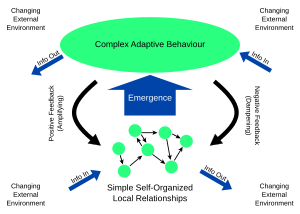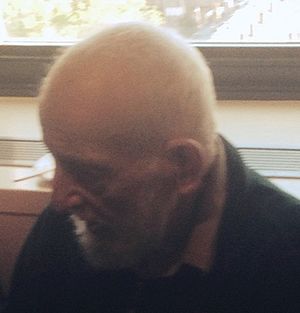Richard Levins facts for kids
Quick facts for kids
Richard Levins
|
|
|---|---|
| Born | June 1, 1930 |
| Died | January 19, 2016 (aged 85) Cambridge, Massachusetts, U.S.
|
| Nationality | American
|
| Alma mater | Cornell University (agriculture and mathematics), Columbia University |
| Known for | mathematical ecology, political activism, population genetics, evolution in changing environments, farming in Cuba, and metapopulations (a Marxist theory of biology)
|
| Spouse(s) | Rosario Morales (1950), died 2011; 3 children: Aurora Levins Morales, born February 24, 1954, Indiera Baja, Maricao, Puerto Rico, Ricardo Levins Morales, Alejandro 'Jandro' Levins |
| Scientific career | |
| Fields | mathematical ecology, evolutionary biology, scientific modelling, loop analysis, complexity, philosophy of science, “looking at the whole” |
| Institutions | University of Puerto Rico (1961 to 1967), University of Havana, New York University, University of Chicago, Harvard University, Harvard School of Public Health |
| Thesis | Theory of fitness in a heterogeneous environment, published by Essex Institute, New York, 1965 (1965) |
Richard Levins (June 1, 1930 – January 19, 2016) was an American biologist and scientist. He studied how living things change over time and how they interact with their surroundings. Levins was also a philosopher of science, meaning he thought deeply about how science works.
He was a professor at the Harvard T.H. Chan School of Public Health. Levins was also known for his work on how living things evolve in changing environments. He studied groups of populations called metapopulations.
Levins wrote about important ideas in biology and how to use models in science. One of his famous articles was "The Strategy of Model Building in Population Biology". He believed that science should look at the "whole picture" of things. Levins often said his scientific methods were inspired by the ideas of Marx.
With another scientist, Richard Lewontin, Levins wrote many articles. These articles covered how to study biology, the philosophy behind it, and its social impacts. Many of their ideas are in their book, The Dialectical Biologist. They also wrote Biology Under the Influence: Dialectical Essays on Ecology, Agriculture, and Health.
Levins and Lewontin also wrote funny articles together using the fake name Isadore Nabi. They even managed to get a silly biography of Nabi into a respected science book. This showed how easily false information could be published.
Contents
Richard Levins's Early Life and Education
Richard Levins was born on June 1, 1930, in Brooklyn, New York. His family had Ukrainian Jewish roots. He wrote about his childhood, saying he was interested in politics and science from a young age.
He read a book about microbe hunters when he was 8 years old. By age 12, he was reading books by Charles Darwin, who developed the theory of evolution. At 10, Levins was inspired by the writings of J. B. S. Haldane, another important biologist.
Levins studied agriculture and mathematics at Cornell University. In 1950, he married Rosario Morales, a writer from Puerto Rico.
Life and Work in Puerto Rico and Cuba
After graduating from Cornell, Levins and Rosario moved to Puerto Rico. They worked on a farm and helped organize people in rural areas. They returned to New York in 1956, where Levins earned his PhD from Columbia University in 1965.
From 1961 to 1967, Levins taught at the University of Puerto Rico. He was a strong supporter of the Puerto Rican independence movement. In 1964, he visited Cuba for the first time. This trip started a long partnership with Cuban biologists and politicians.
Because of his involvement in the independence and anti-war movements, he was not given a permanent teaching position at the University of Puerto Rico. In 1967, he, Rosario, and their three children – Aurora, Ricardo, and Alejandro – moved to Chicago. There, he taught at the University of Chicago and worked closely with Richard Lewontin.
Later, Richard and Rosario moved to Harvard University. Levins was chosen to be a member of the US National Academy of Sciences. However, he resigned because the Academy advised the US military during the war.
Later Career and Focus on Global Health
Until his death, Levins was a professor at the Harvard School of Public Health. He led the Human Ecology program. In the early 1990s, Levins and other scientists formed a group at Harvard. They studied new and returning diseases. Their research showed that many new infections came from changes in the environment, both natural and human-caused.
In his last twenty years, Levins focused on using ecology to improve agriculture. He was especially interested in helping less developed countries. He worked to find ways to farm that were fair to people, good for the environment, and helped poor communities.
When his wife Rosario passed away in 2011, his daughter Aurora moved in with him in Cambridge, Massachusetts. One of Levins's grandchildren is the hip hop artist Manny Phesto.
Richard Levins died in Cambridge, Massachusetts, on January 19, 2016. A species of lizard, Sphaerodactylus levinsi, is named in his honor.
Evolution in Changing Environments
Before Levins's work, scientists often studied evolution assuming the environment stayed the same. They also studied ecology assuming that the genetic makeup of species didn't change. Levins created models that showed what happens when species evolve while their environment is also changing.
One surprising result of his models was that species might not always become perfectly adapted. In fact, they could even evolve in ways that lead to their own extinction. He wrote about these ideas in his book, Evolution in Changing Environments. This book was based on lectures he gave in Cuba in the early 1960s. Levins used a lot of mathematics in his work, sometimes even inventing new math tools.
Metapopulation Theory
In 1969, Levins created the term "metapopulation". This describes a "population of populations." Imagine a group of small animal populations living in different patches of suitable habitat. Each patch can support its own local group.
Sometimes, a local group might die out in one patch. But then, new animals from other patches can move in and start a new group there. The survival of the entire metapopulation depends on how well these local extinctions and new colonizations balance out. Levins created a simple mathematical model, known as the Levins model, to explain how these systems work.
Metapopulation theory has become very important in ecology. It helps scientists in conservation biology (protecting species), managing animal populations, and controlling pests.
Important Ideas from Richard Levins
- "The world is stranger than we can imagine and surprises are inevitable in science. Thus we found, for example, that pesticides increase pests, antibiotics can create pathogens, agricultural development creates hunger, and flood control leads to flooding. But some of these surprises could have been avoided if the problems had been posed big enough to accommodate solutions in the context of the whole." - Dr. Richard Levins
This quote means that sometimes, solutions to problems can cause new, unexpected problems. Levins believed that to avoid these surprises, we need to look at the bigger picture and understand how everything is connected.
Awards and Recognition
- Edinburgh Medal in Science and Society
- Lukács 21st Century Award (for his work in mathematical ecology)
- Many awards in Puerto Rico and Cuba for his contributions to ecology and agriculture. This includes the 30th Anniversary Medal of the Cuban Academy of Sciences.
- Robert Wood Johnson Foundation 'Investigator Awards in Health Policy Research' in 1995.
- Honorary Doctorate in Environmental Science from the University of Havana in 1999.
- Honorary Master of Philosophy in Human Ecology from College of the Atlantic in 2012.
- American Public Health Association's 2007 Milton Terris Global Health Award.
- A special event called "The Truth is the Whole: A Symposium in Celebration of the Unity and Dynamic Complexity of Life" was held for his 85th birthday at Harvard T.H. Chan School of Public Health in 2015.
See also
 In Spanish: Richard Levins para niños
In Spanish: Richard Levins para niños
- Aurora Levins Morales
- Cuba
- Dialectic
- Eco-socialism
- Ecosocial theory
- Metapopulation
- Population dynamics
- Richard Lewontin





